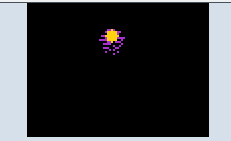Difference between revisions of "Element:PTNM"
(Enter a short summary [b]) |
m (Enter a short summary [b]) |
||
| (2 intermediate revisions by one other user not shown) | |||
| Line 42: | Line 42: | ||
{{MaterialBtn|SHLD}} progresses to the next stage and grows instantly without the need for SPRK | {{MaterialBtn|SHLD}} progresses to the next stage and grows instantly without the need for SPRK | ||
| − | {{MaterialBtn|ISZS}} / {{MaterialBtn|ISOZ}} | + | {{MaterialBtn|ISZS}} / {{MaterialBtn|ISOZ}} → {{MaterialBtn|PLUT}} + {{MaterialBtn|PHOT}} |
| − | at over 7 pressure and 200C: {{MaterialBtn|WTRV}} + {{MaterialBtn|BCOL}} | + | at over 7 pressure and 200C: {{MaterialBtn|WTRV}} + {{MaterialBtn|BCOL}} → {{MaterialBtn|OIL}} |
=== Probabilistic reactions === | === Probabilistic reactions === | ||
| − | The following | + | The following reactions happen based on quadratic probability curve, from 0% at -273.15C up to a 100% chance at 1500C |
| − | {{MaterialBtn|SMKE}} | + | {{MaterialBtn|SMKE}} → {{MaterialBtn|CO2}} |
| − | + | {{MaterialBtn|RSST}} → {{MaterialBtn|BIZR}} | |
| − | at over 50 pressure and 1000C: {{MaterialBtn|BREL}} | + | at over 2 pressure and 200C: {{MaterialBtn|GAS}} → {{MaterialBtn|INSL}} + 60C |
| + | |||
| + | at over 50 pressure and 1000C: {{MaterialBtn|BREL}} → {{MaterialBtn|EXOT}} + -30C | ||
=== Hydrogen reactions === | === Hydrogen reactions === | ||
There is a class of reactions that occur when both HYGN and another element are nearby. | There is a class of reactions that occur when both HYGN and another element are nearby. | ||
| − | {{MaterialBtn|HYGN}} + {{MaterialBtn|DESL}} | + | {{MaterialBtn|HYGN}} + {{MaterialBtn|DESL}} → {{MaterialBtn|OIL}} + {{MaterialBtn|WATR}} |
| − | {{MaterialBtn|HYGN}} + {{MaterialBtn|OXYG}} | + | {{MaterialBtn|HYGN}} + {{MaterialBtn|OXYG}} → {{MaterialBtn|DSTW}} + {{MaterialBtn|SPRK}} + 5C |
Two {{MaterialBtn|HYGN}} at greater than 500C have a 1/1000 chance to perform ''cold fusion''. This creates one {{MaterialBtn|NBLE}}, one {{MaterialBtn|NEUT}}, one PHOT, and rarely (1/10) one {{MaterialBtn|ELEC}}. This also generates 1000C and 10 pressure. | Two {{MaterialBtn|HYGN}} at greater than 500C have a 1/1000 chance to perform ''cold fusion''. This creates one {{MaterialBtn|NBLE}}, one {{MaterialBtn|NEUT}}, one PHOT, and rarely (1/10) one {{MaterialBtn|ELEC}}. This also generates 1000C and 10 pressure. | ||
Latest revision as of 14:27, 8 October 2024
 Platinum. Catalyzes certain reactions. | |
| Properties | |
|---|---|
| Section | Solids |
| Spawn temperature | 22°C |
| Heat Conductivity | 100% |
| Relative weight | 100 |
| Gravity | 0.0 |
| Acid dissolve rate | 0% |
| Flammability | 0 |
| State | Solid |
| Transitions | |
| High temperature |
|
| Misc properties | |
| Conducts electricity (SPRK) | |
| Source code | |
Reactions
Every reacting element must directly touch PTNM in order to react!
![]() progresses to the next stage and grows instantly without the need for SPRK
progresses to the next stage and grows instantly without the need for SPRK
at over 7 pressure and 200C: ![]() +
+ ![]() →
→ ![]()
Probabilistic reactions
The following reactions happen based on quadratic probability curve, from 0% at -273.15C up to a 100% chance at 1500C
at over 2 pressure and 200C: ![]() →
→ ![]() + 60C
+ 60C
at over 50 pressure and 1000C: ![]() →
→ ![]() + -30C
+ -30C
Hydrogen reactions
There is a class of reactions that occur when both HYGN and another element are nearby.
Two ![]() at greater than 500C have a 1/1000 chance to perform cold fusion. This creates one
at greater than 500C have a 1/1000 chance to perform cold fusion. This creates one ![]() , one
, one ![]() , one PHOT, and rarely (1/10) one
, one PHOT, and rarely (1/10) one ![]() . This also generates 1000C and 10 pressure.
. This also generates 1000C and 10 pressure.
Uses
- It conducts fast like ![]() , but with a higher melting point.
, but with a higher melting point.
This tutorial save demonstrates the above reactions in game.
| Language: | English |
|---|